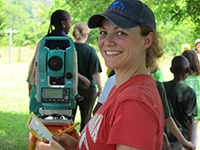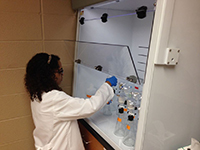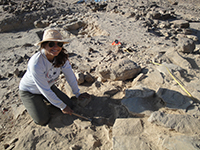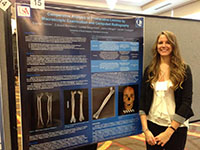Anthropology Advising Guide
Department of Sociology, Anthropology, Social Work
What is Anthropology?

Anthropology is the study of past and present humankind. Utilizing knowledge from the biological, social, and behavioral sciences, anthropology represents a holistic and humanistic discipline, bringing together a variety of perspectives to learn about ancient peoples and to solve modern problems. Anthropologists take both a comparative and evolutionary perspective to more fully understand what it means to be human, and to explore human similarities and differences across geographic space and time.
American anthropology is commonly divided into four fields: cultural anthropology, linguistic anthropology, archaeology, and biological anthropology.
Cultural anthropologists study societies in the contemporary world using the method of participant observation, in which researchers reside in a community, learn its language, observe social behavior, and conduct interviews of community members. Traditionally, anthropologists studied mostly small-scale indigenous societies, where they examined religion, kinship, production and exchange, political beliefs, food practices, and other aspects of social life. These remain an important focus of research, but increasingly cultural anthropologists have turned their attention to larger-scale developed societies. Participant observation in modern settings offers insights into many problems of contemporary social life, including religious and ethnic conflict, the effects of climate change, globalization, social inequality, health disparities, and addiction.
Language – the ability to represent meaning through symbols and to communicate those meanings to other people – is a hallmark of all human societies. Linguistic anthropologists study the social and cultural contexts of human communication. How does language symbolically represent our natural, supernatural, and social worlds? How does our day-to-day use of language reflect our social identities of region, social class, gender, and ethnicity? In addition, the comparison of distinct languages can offer evidence of their historical evolution and illuminate past and contemporary relationships between their speakers. By documenting indigenous vocabularies and grammars, linguistic anthropologists also contribute to the revitalization of endangered languages in the modern world.
Biological (or physical) anthropologists study human biological variation and adaptation in response to the natural and cultural environments of the past and present. They seek to understand what it means to be human by taking into account our unique evolutionary and individual life histories, in all their diversity. This broad discipline encompasses approaches ranging from comparative observations of non-human primates (primatology), physical variation and population genetics (human biology), hominid evolution (paleoanthropology), and the study of ancient human skeletal remains from the archaeological record (bioarchaeology). More recently, these methods have been applied to assist law enforcement with the forensic identification of modern human remains (forensic anthropology). By utilizing a biological perspective, these anthropologists seek to explore the dynamics of the human condition and our continued evolution into the future.
Archaeologists study our ancestors through material remains (artifacts) in order to reconstruct the past, inform our present, and look to the future. Fieldwork involves an array of sophisticated methods and careful excavation techniques to identify archaeological sites and recover traces of a past human presence. An archaeologist will often specialize in the analysis of certain artifact types, such as animal bones (zooarchaeology), pottery, plant remains (paleoethnobotany), or stone tools. From two million-year-old stone tools in Africa, to early 20th-century houselots in downtown Mobile, Alabama, archaeologists analyze the physical evidence of the past in pursuit of a broad and comprehensive understanding of human culture.
Career Opportunities in Anthropology

An undergraduate degree in Anthropology can prepare you for a number of exciting career paths. While traditionally, anthropologists have been employed in university settings, many other opportunities are available in today’s world for trained anthropologists with a Bachelor’s or Master’s degree, including work in government, corporate centers, museums, non-profit organizations, and cultural resource management. According to the U.S. Bureau of Labor Statistics, "Employment of anthropologists and archaeologists is expected to grow 19% from 2012 to 2022, faster than the average for all occupations.”
At a glance…
- Archaeology: Most professional archaeologists work in cultural resource management (CRM) - they mitigate the effects of federal undertakings on archaeological sites. Other archaeologists are employed by museums, universities, and government agencies.
- Cultural Anthropology: Cultural anthropologists are increasingly being employed by corporations, non-profit and advocacy groups, and government agencies.
- Biological Anthropology: While some biological anthropologists may work in an academic setting, others work in forensic labs or with law enforcement, zoos, pharmaceutical firms, museums, or in industry.
- Linguistic Anthropology: In addition to working in academic settings, linguistic anthropologists are often employed by government agencies and corporations.
Salary Trends in Anthropology
Salaries earned by anthropologists are dependent on degree level. According to a recent survey by the U.S. Bureau of Labor Statistics, anthropologists in the United States earned a median salary of over $63,000 per year during 2019, up from a median salary of $57,000 in 2012. In 2011, the highest employment level in anthropology was found in the South and Southwestern United States.
High School Preparation
Many students are not exposed to anthropology until college; however, even if your high school does not have anthropology courses, there are still high school classes you may find useful before entering college and declaring a major or minor in Anthropology. Depending on the particular field of anthropology you are contemplating, consider taking coursework in social studies, history, or other social sciences, math (statistics is especially useful), physical sciences like biology and chemistry, as well as a foreign language. Computer skills are important, as are good writing skills. Courses that encourage critical thinking are especially useful.
How to Major in Anthropology

To major in Anthropology, students must take a minimum of 35 credit hours in anthropology courses, as well as SY 109, for a total of 38 credit hours. Students should first complete core courses in AN 100, AN 101, and AN 121/121L before moving on to upper division courses. Students must take AN 454 (theory), AN 300 (Thinking Anthropologically), as well as one 300+ course in each of the following fields: archaeology, biological anthropology, and cultural anthropology. Majors must complete their remaining 12 hours in Anthropology at the 200+ level.
Students pursuing a degree in Anthropology must have a minor in another discipline. A degree in Anthropology with honors is also available.
To minor in Anthropology, students must take a minimum of 18 credit hours in anthropology courses, including AN 100 and AN 101.
***
The minimum requirements for a B.A. in Anthropology in the USA College of Arts & Sciences are as follows:
| Core Courses: |
|---|
| AN 100: Introduction to Cultural Anthropology |
| AN 101: Introduction to Archaeology and Biological Anthropology |
| AN 121/L: Biological Anthropology |
| Upper Division Requirements: |
| AN 300 Thinking Anthropologically (one-credit hr.) |
| 300+ level Archaeology course |
| 300+ level Biological Anthropology course |
| 300+ level Cultural Anthropology course |
| AN 454: Anthropological Theory |
| 4 additional upper division anthropology courses (200+ level) |
| Additional Courses: |
| SY 109: Introduction to Sociology |
Special Programs, Internships, and Directed Studies

We encourage students to take advantage of the many hands-on opportunities in Anthropology available to them while at USA. Students can gain archaeological experience in the field or lab by working with the Center for Archaeological Studies and the USA Archaeology Museum. Students interested in forensic anthropology have the opportunity to work on real forensic cases with faculty and the Mobile Police Identification Unit. Numerous internships are also available with area institutions including the Mobile Medical Museum, the Poarch Band of Creek Indians’ Office of Archives and Records Management, the History Museum of Mobile, and the Mobile Municipal Archives.
Students are especially encouraged to engage in independent research with faculty through Directed Studies, Senior Theses, or by joining them on both domestic and international excavation and research projects around the globe. We also offer three associated programs and minors to help complement student interests, including the Forensic Science minor, a minor in Museum Studies, and the Native American Studies Program.
Anthropology Highlights

What’s so unique about Anthropology here at USA? Here are a few examples of the many
opportunities available to students:
- Survey local archaeological sites and analyze artifacts with the Center for
Archaeological Studies and its associated labs - Work with ancient skeletal remains with Dr. Gregoricka, either on campus or in the
field in the United Arab Emirates - Learn how to excavate with Dr. Nelson at archaeological sites in the Mobile-Tensaw
Delta and Gulf of Mexico Coast - Work closely with Drs. Carr, Gregoricka, Nelson, or Sanchez to develop your own
research project - Engage in community service by giving tours to elementary and middle school
students at the USA Archaeology Museum with Jen Knutson - Intern at a local museum and design and implement a public exhibit
- Investigate local, active forensic anthropology cases with Dr. Gregoricka
- Present your research at professional conferences, including the Southeastern
Archaeological Conference and the American Association of Biological Anthropologists - Attend guest lectures with world-renowned anthropologists
- Work with our active and student-run Student Anthropological Society, which plans
multiple events, lectures, and trips each year - Apply for our numerous anthropology scholarships and awards given out each April
at our annual Departmental Awards Ceremony
Academic Plan
Following an academic plan will help you stay on track to graduate in four years.
To see a sample academic plan for this major, please click here. Degree plans provide only a suggested schedule; make sure to meet with your academic advisor to find the actual schedule that is right for you.
For More Information
Please contact Dr. Lesley Gregoricka (lgregoricka@southalabama.edu) or Dr. Philip Carr (pcarr@southalabama.edu) with any questions about our program.
You can find us on campus at:
Department of Sociology, Anthropology, and Social Work
5991 USA Drive North
Humanities Building Rm. 34
Mobile, AL 36688-0002
Phone: (251) 460-6347
Fax: (251) 460-7925
Website: https://www.southalabama.edu/colleges/artsandsci/syansw/anthropology/index.html
Facebook Page: https://www.facebook.com/usa.anthropology
*The information on this page should be considered general information only. For more specific information on this and other majors, please refer to the USA bulletin or contact the department/College directly.

